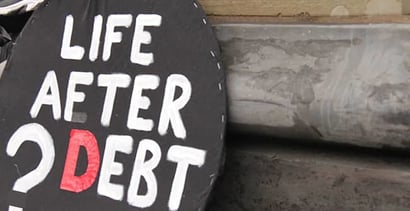

Debt can get out of control really fast.
Between your credit cards, your student loans and your mortgage, it is easy to owe thousands in debt. You may even owe more than you make in an entire year.
At this point, it can feel like you won’t ever be able to pay everything off. Don’t get discouraged though.
With some planning and hard work, it is possible to pay off even massive amounts of debt.
1. Figure out your debt situation
Before you can put together a plan to pay off your debt, you need to figure out exactly where you stand first.
Make a list of all your current debts and be sure to include key information like when payments are due each month and the interest rate on each debt.
You need to know your monthly payment due dates by heart. Otherwise, you might miss payments which will cost you extra penalty fees and add to your massive debt.
By ranking your debts in order of interest rates, you can figure out which ones would be most effective to pay off first as well.
Generally, it is a good idea to pay down high-interest loans faster because they are costing you more per month in interest.
2. Create a budget that maximizes debt payment
The key to paying down your massive debt is to make sure you are putting money away each month for this goal. Do you currently use a budget to track your spending?
Many Americans don’t have a budget, which makes it very hard for them to track their money.
At the end of the month, all of their money was spent. This leaves no money for financial goals.
Instead, create a monthly budget that list subtracts your necessary expenses from your income. This will give you a good idea how much money you should have left over at the end of the month that you could put towards your debt.
3. Make extra payments when possible
If you start making regular monthly payments towards your debt, you have already taken a big step towards fixing your problem.
“To get debt-free even faster, you should look
for any possible way to make extra payments.”
Any time a little extra money comes in, like from your tax return or a company bonus, plan to put that towards your debts.
All of these little extra payments will add up and help you reach your goal ahead of schedule.
4. Pledge to stop adding debt
One of the reasons why it is so hard to get out of debt is because it is too easy to undo your progress.
You work really hard for a few months to pay off your accounts only to make an impulse purchase on your credit card. If your goal is to become debt-free, you need to stop adding to the problem.
Consider chopping up your credit cards and plan to delay any major purchases until you can pay them off in cash. This lifestyle choice will make your consider all your spending so you will be able to tell whether something is truly worth buying or not.
5. Consider a formal debt repayment service
Managing a large amount of debt is not only stressful, but can also be challenging to figure out. If you really feel overwhelmed, you may want to sign up for a formal debt repayment service.
These services can help you consolidate all your debt into one account which makes it easier to plan payments.
Your service would also be able to tell you exactly when you will become debt-free on your current plan, plus it helps you find ways to budget your money.
This could be the extra push you need to tackle your problem.
Paying off a large amount of debt will be a challenge, but the sooner you can start the easier everything will be.
Use this advice and you’ll put yourself on the path to becoming debt-free.
Photo Source: www.huffingtonpost.com
Advertiser Disclosure
BadCredit.org is a free online resource that offers valuable content and comparison services to users. To keep this resource 100% free for users, we receive advertising compensation from the financial products listed on this page. Along with key review factors, this compensation may impact how and where products appear on the page (including, for example, the order in which they appear). BadCredit.org does not include listings for all financial products.
Our Editorial Review Policy
Our site is committed to publishing independent, accurate content guided by strict editorial guidelines. Before articles and reviews are published on our site, they undergo a thorough review process performed by a team of independent editors and subject-matter experts to ensure the content’s accuracy, timeliness, and impartiality. Our editorial team is separate and independent of our site’s advertisers, and the opinions they express on our site are their own. To read more about our team members and their editorial backgrounds, please visit our site’s About page.




